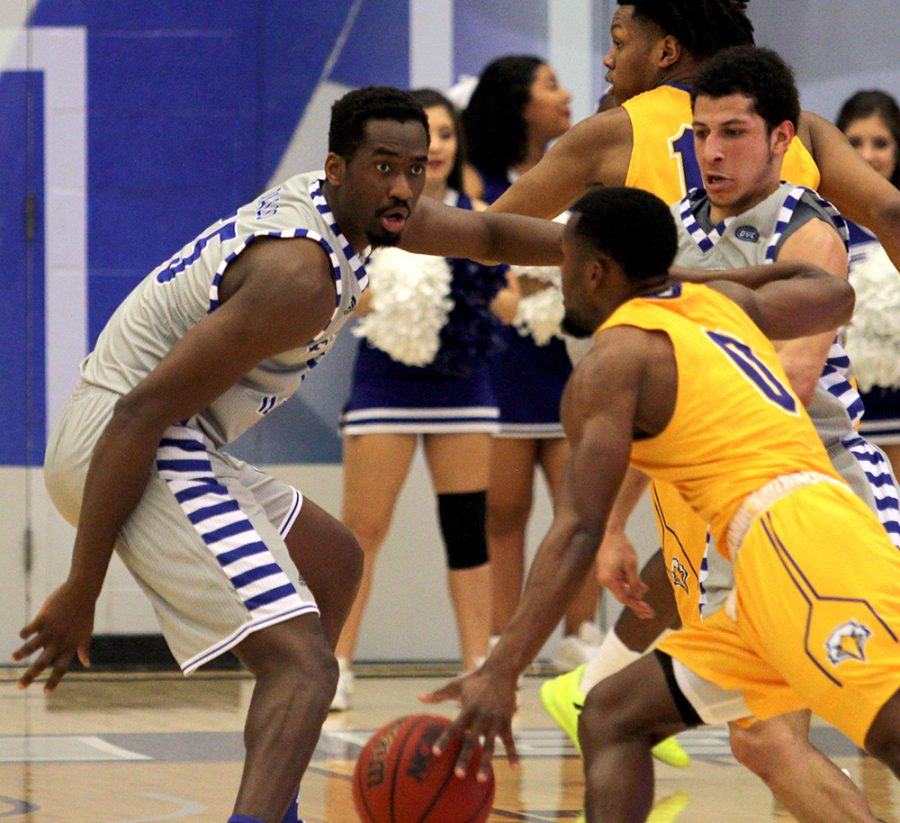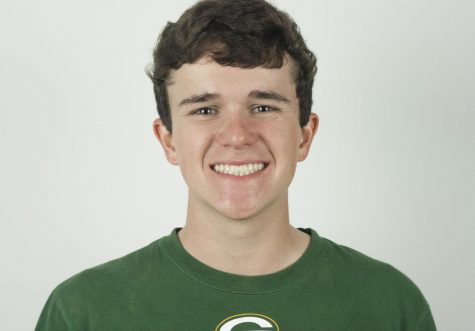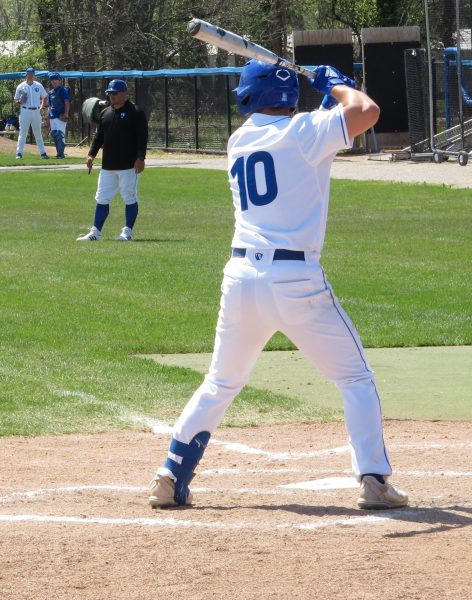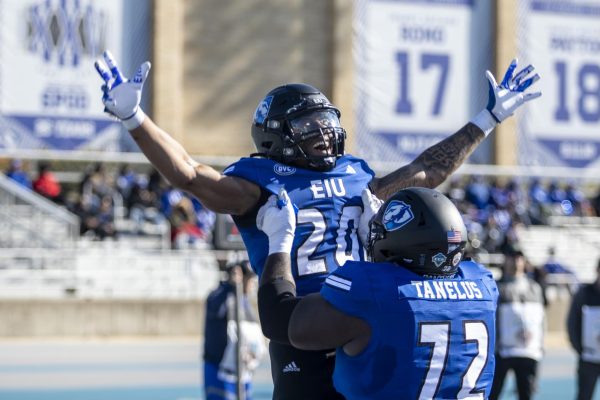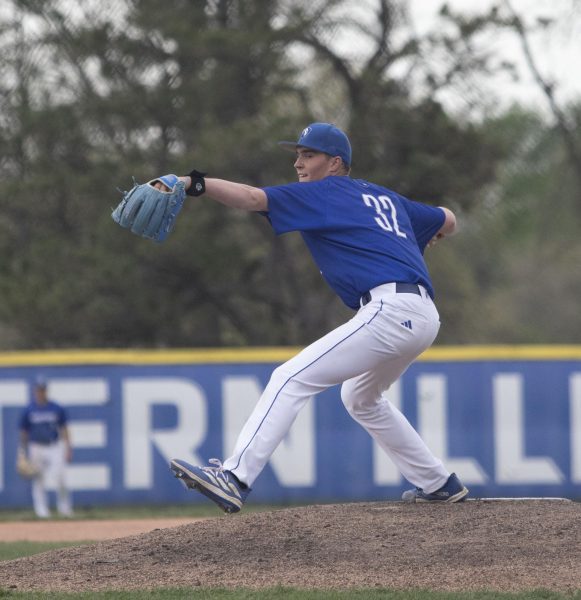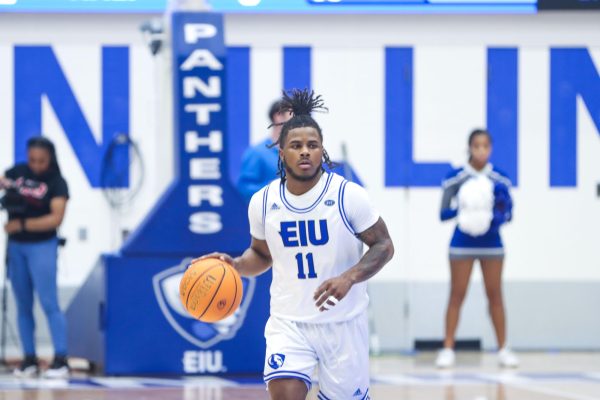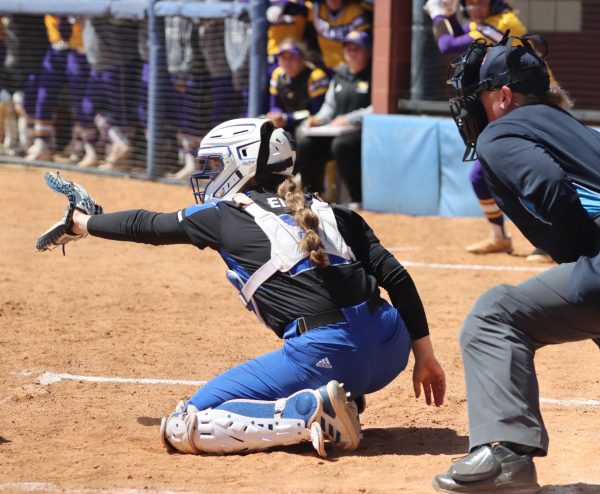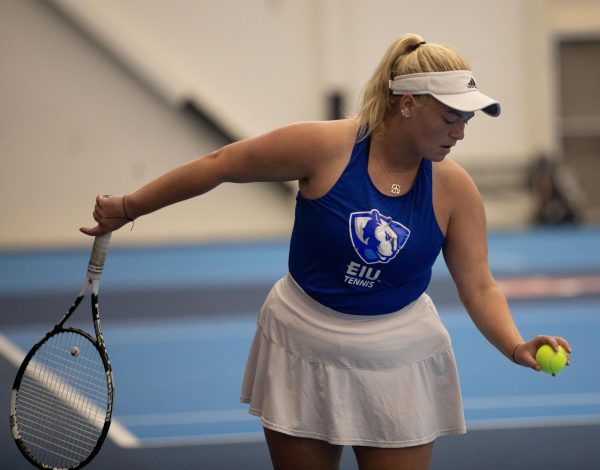Slaria, Diallo talk about moving countries
Aboubacar Diallo (far left) plays defense on a Morehead State player in Eastern’s 84-78 loss to the Eagles on Saturday. Diallo is a native of the Ivory Coast.
February 5, 2019
As the air vessel fell, incrementally closing in on O’Hare International Airport, the speed breaks sprung into operation and the flaps flung up. Senior Srishti Slaria descended on what would be her home for the next four years, with the ripples of Lake Michigan and Chicago’s skyline peering through her airplane window.
Her parents were in close proximity, but soon they would not be.
Although the 17-year-old Slaria arrived in Chicago with her parents, they were only to accompany her on the voyage, not the journey.
Then they were gone. They boarded a plane back to India, where Slaria’s route to collegiate tennis began.
That reality proved most difficult, for the separation from loved ones was quite a variation in her routine.
Such are the trials of the international athlete. Entire oceans, continents and time zones stand in the way of both them and their familial contacts abroad. The differences between life in the United States and their native countries are night and day.
When the hands on the Alumni Association clock tower turn to 10:00 p.m., and the Alma mater song harmonizes in unison, the time in New Delhi is 9:30 a.m.
Keeping in touch, even with access to Skype or other video messaging applications, can be a taxing, and sometimes impossible target to reach.
“I just think the hardest part is being away from the family,” Slaria said.
Senior men’s basketball player Aboubacar Diallo’s mom worries. She has always worried about her six-foot-nine, 200-pound center, who passed Mussa Dama for the third most blocks in school history on Saturday.
Aside from a virtual reunion on facetime, she cannot see him. They live nearly 6,000 miles apart—he in Charleston, Illinois, and she in Abidjan, Ivory Coast.
Diallo no longer informs his mom of the back and hip injuries on the basketball court, anxious she might conceive them more severe than they happen to be in reality.
When he reported his afflictions to her in high school, his mom grew disconcerted.
“So I have to keep by myself, and keep fight through and get better every day,’ Diallo said.
Any time she ask me questions, I say, ‘I’m fine.’”
His mom has not been able to watch any of his games. But if she were in attendance, Diallo’s performance would, in response, vastly improve.
“If you know your mom watch you, it’s not like somebody else, it’s your mom,” Diallo said. “You want your mom to be proud of you. So you want to do everything well, not good, but well.”
There have been struggles, none of them dealing even tangentially with basketball.
His frustrations have been the product of an unfamiliarity with the English language, of an aversion to the American diet, of his annoyance with the unforgiving weather patterns of the Midwest.
Diallo has found the task of conquering the English language a challenge, if only because of the time it takes to complete assignments and exams.
Diallo once spent four hours typing one page of text for an English paper his freshman year at Eastern.
Teachers in high school permitted him to use Google in order to decipher test questions, though three years later, as a freshman college student, his teachers prohibited such an accommodation.
On the court, he was busy translating defense into offense.
And off it, it meant translating English into French, his native tongue.
In his junior and senior years of high school, when Diallo began a life in the United States, a Canadian player on his basketball team was a channel through which Diallo, who knew little English upon his arrival, could communicate with his coaches.
The day his coaches picked him up as a junior, they asked where he wanted to eat that day.
Diallo had a place in mind.
He had a hankering for McDonalds.
Diallo, in fact, had never been to one before, as McDonalds does not exist back home.
It did not take long for him to deem McDonalds, like the American diet in general, as subpar.
“Your food sucks,” Diallo said.
In Slaria’s experience, acclimating to tennis in the United States required patience. Back on the tennis circuit in India, players were on their own. Spectators did not erupt in excitement, unlike how, throughout her collegiate career, Slaria’s teammates have shouted out their approval during matches.
“It is hard to have some people cheering on you,” Slaria said. “You can get intimidated by it.”
Slaria, whose father is a government employee, moved the family on 15 separate occasions as part of his job, switching schools every year and a half or so. She was, in a sense, used to moving by freshman year.
“I think I have had that adaptability of going to new places, meeting new people and adjusting,” Slaria said. “I thing that’s the biggest thing I feel helped me adjust because I know how it is to come to a new place.”
Tom O’Connor can be reached at 581-2812 or [email protected]



































